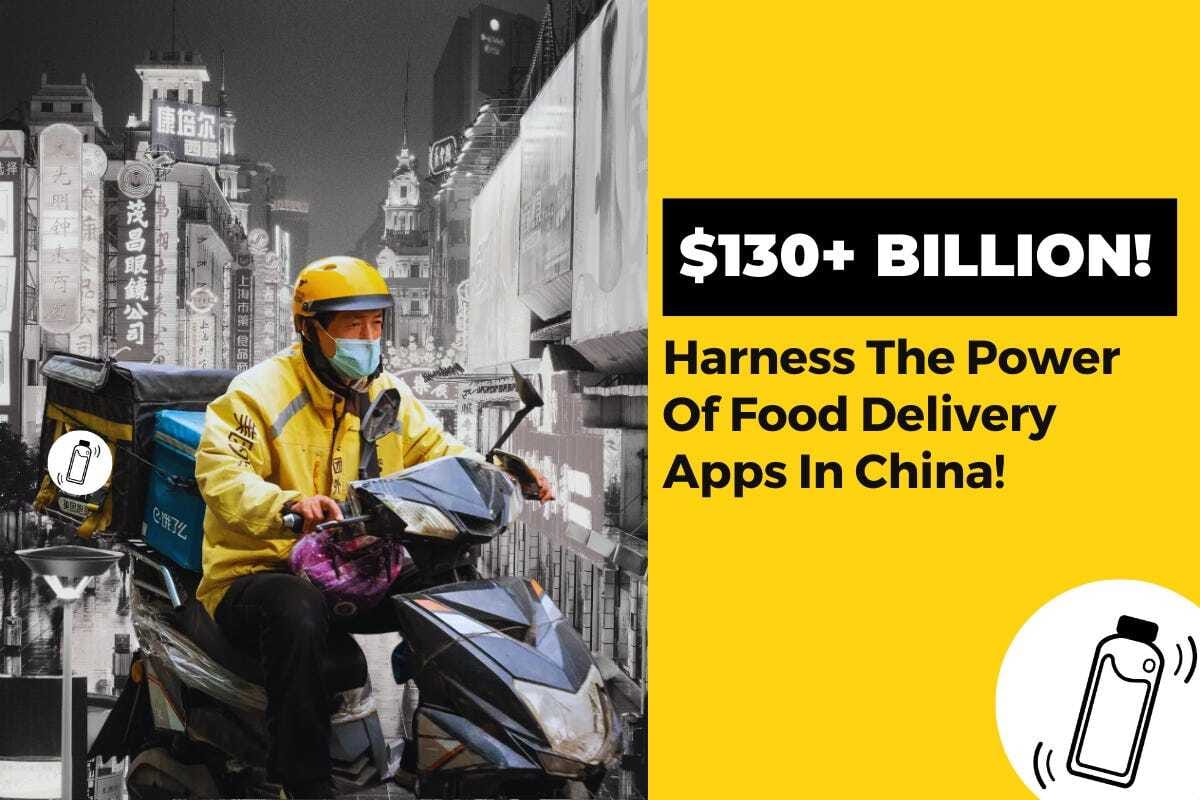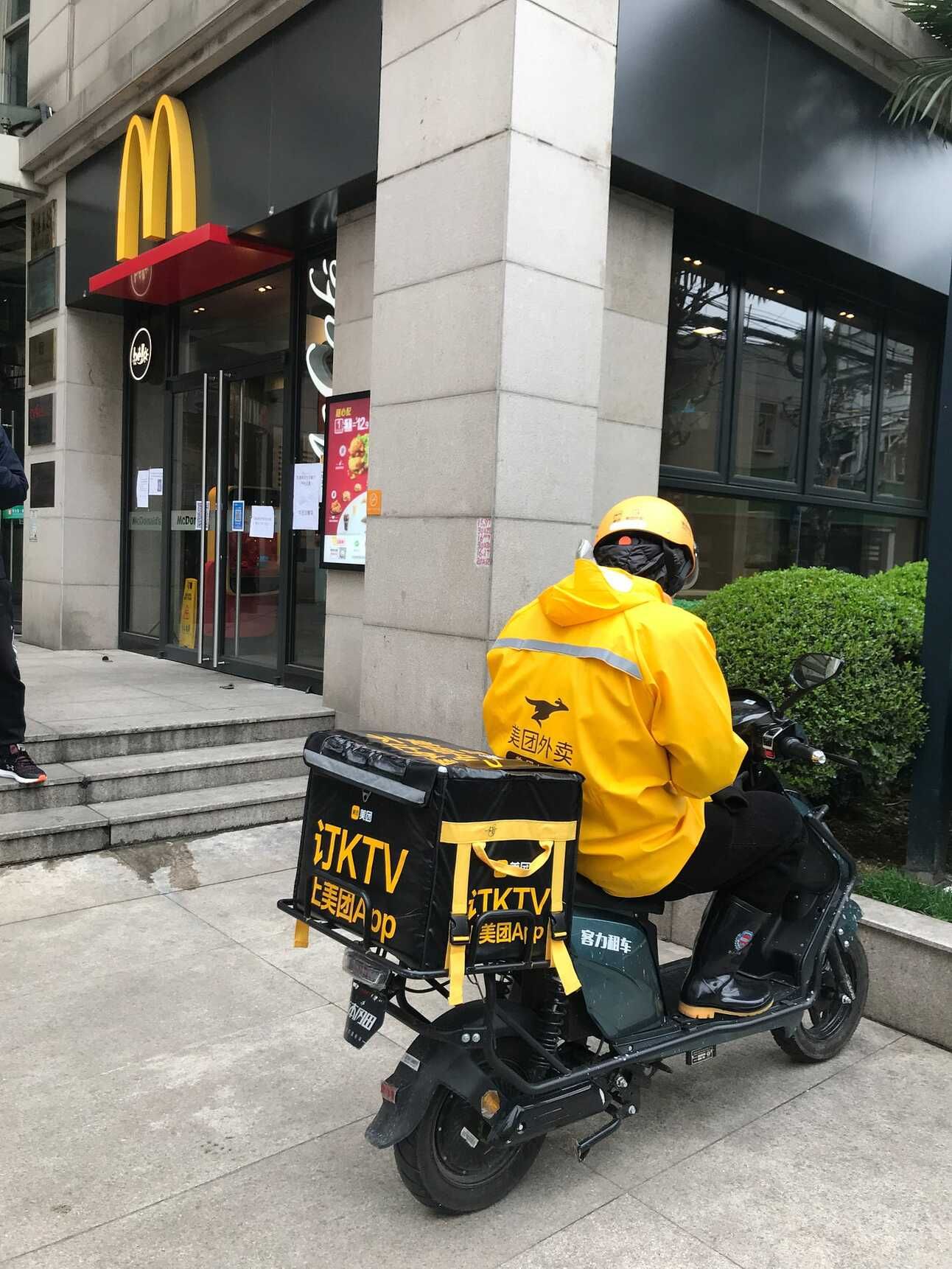China is the biggest market in the world for food delivery. Powered by two competing super apps, local consumers seem set to continue ordering their food online even after the pandemic. In today’s newsletter, we explore the food delivery trend in China with the support of local expert, Felipe Cabrera.
Before that, we have exciting news about Japan’s premier food tech event, SKS Japan 2023, which takes place later this week. Check out all the details and how you can participate below 👇
Today:
📆 Unmissable Event: Join SKS Japan 2023 | July 27 ~ 29
📰 In The News: Chipotle’s avocado robot, Nestle’s sugar reduction breakthrough, and more.
🚀 Innovation Deep Dive: Harness the Power of China's Food Delivery Apps

📆 Unmissable Event: SKS Japan 2023 | July 27 ~ 29

⏰ The countdown to this year’s edition of Japan’s premier food tech event has begun. This Thursday, SKS Japan 2023 will kick off, launching three days of:
🎤 40+ inspiring panels led by 80+ leading innovators from the F&B world
🤝 1 - 1 Meetings and networking with panelists and attendees
🍜 21 exhibitors showcasing novel food, drink, and tech
The most exciting thing? You can still be a part of this! You can join the event live in Tokyo or online from anywhere in the world:
About SKS Japan 2023
🚀 Launched in 2017 as Japan's edition of the global food tech summit, SKS has become a melting pot of food innovators from all over the world. SKS Japan explores the relationship between “Food X Technology & Science”, inviting industry leaders to embark on a journey, envisioning the food industry's future across the globe. During the event, you’ll discuss the blueprint for an ideal global food system, the essence of diverse values around food, and the importance of building business through co-creation.
🇯🇵 As Japan’s premier food tech event, the role that Japan can play to influence global food innovation will be hotly discussed. Japan's precision taste design tech, rich food culture and traditions, innovative appliance and robotics technology, diverse regional food ingredients and customs, and commitment to creativity and innovation in food are revered the world over. At this year’s SKS you can join global F&B industry leaders as they discuss how Japan can take a leading role in solving the challenges of our current food systems.
🔓 The core theme tying SKS Japan 2023 together is UNLOCK, and that’s what the event is all about. Unlocking - the innovation in products and services, the potential in individuals and professionals, and the global presence of Japan's rich food culture.
A Sneak Peek at the Panels
SKS 2023 has lined up leading F&B industry experts from Japan and abroad to join 40+ unmissable panel sessions. Every single one looks fascinating, but here’s five we cannot wait to see:
💸🌎🇯🇵 The State of Food Tech Investment: What Investors Are Looking For Globally and In Japan
Speakers: Angela Tay (Agfunder), Hiroki Okada (Kemuri Ventures), Andrew Ive (Big Idea Ventures), Taka Nakamura (taliki), Barry O’neill (Value Create)[Moderator]
🌱 🧪🥛 The Latest Trend of Precision Fermentation
Speakers: Daiki Ninomiya (Ajinomoto), Ali Wing (Oobli), Masahito Hosokawa (bitBiome), Michael Wolf (The Spoon)[Moderator]
🥑👉🙋 The State of Personalized Nutrition
Speakers: Yoshinori Mizuguchi (Metagen), Masahiro Koyama (Wellnas), Shuhei Tsukada(Leave a Nest), Tomomichi Sumi (SIGMAXYZ) [Moderator]
🌏🥨🛠 Global Food Tech Ecosystem Builders Session
Speakers: Andy Zynga (EIT Food), Adam Lyle (Padang), Semi Hakim (Kök Projekt), Paulo Silveira (Foodtech Hub Latam), Hirotaka Tanaka (SIGMAXYZ), Michael Wolf (The Spoon)[Moderator]
🍟🦾🚀 How Can We Transform The Restaurant Industry With Food Robotics?
Speakers: Andy Lin (Yo-kai Express), Buck Jordan (Vebu Labs), Yuji Shiraki (TechMagic), Michael Wolf (The Spoon) [Moderator]
Check out the full agenda for SKS Japan 2023 here to see a complete list of panels and their speakers.
Only A Few Tickets Remaining!
🏃🤝 As we go to press, there are still a few tickets available for the physical event. But whether you join us at the venue or tune in online, you'll be at the heart of the latest foodtech trends, products, and services. Don't miss this opportunity to connect with key players and exchange ideas to forge future collaborations.
Details in Japanese
『SKS JAPAN 2023 -Global Foodtech Summit-』を7/27(木)-29(土)に開催(竹橋/オンライン)。
SKS JAPANは、「食×テクノロジー&サイエンス」をテーマとした、米国シアトル発のグローバル・フードテック・サミット「SKS」の日本版として2017年に立ち上がりました。以来、国内外の多様な企業・団体・個人が集まり、繋がり、食の価値の本質を理解するとともに新たなフードシステムを構想し、その実装にも取り組んでいます。
開催6回目となるSKS JAPAN 2023 は、“UNLOCK(アンロック)”を体現する食のイノベーター約90名が登壇し約40のセッションを開催、食の最先端技術を体感できる20件超の展示を実施。
📰 In The News
A curation of our favorite F&B innovation stories from the week. Can be read in less than a 🧻 break.
Chipotle unveils guacamole robot, the Autocado, developed in partnership with Californian robotics startup Vebu.
Keurig Dr Pepper pays $300M for 33% stake in La Colombe, a Philadelphia-based premium coffee company known for its RTD products.
Russia ended the Black Sea grain deal on July 17th, resulting in soaring wheat prices. The deal had previously ended Russian blockades of Ukrainian ports, allowing safe export of grain from Ukraine.
Nestle announces breakthrough enzymatic technology that reduces intrinsic sugars in ingredients such as milk and fruit juice by 30%.
“Eating less meat is equivalent to taking 8 million cars off the road,” says a detailed study by the University of Oxford exploring the environmental impact of UK consumers’ diets.
🚀 Innovation Deep Dive: Harness the Power of China's Food Delivery Apps
Weekly deep dive into an F&B trend. Can be read in less than a 🚋 ride.
Stroll up pretty much any street in a Tier 1 city in China (Beijing, Shanghai, Guangzhou, and Shenzhen) and you will struggle to count the number of food delivery drivers that whizz by you. Most will be adorned with multiple orders of food, like entire takeaways on wheels.
These are signs of the ever-increasing number of people ordering meals from food delivery apps in China. A trend that, according to Shanghai-based expert Felipe Cabrera, is having a transformative impact on the food service landscape there. We sat down with Felipe to discover the latest insights about China’s enormous market for online food delivery.
An Overview of China’s Food Delivery Market
China is the largest market for food delivery in the world. According to research firm ChinaIRN, China’s food delivery market size exceeds 1 trillion yuan in 2023, or almost USD 139 billion.
COVID-19 lockdowns in China greatly increased the use of online food delivery. In 2020 online food delivery had a penetration rate of 42% among Chinese internet users and by 2021 this had jumped to 52.7%.
Even before this though China’s online-to-offline market (O2O) was already the biggest in the world. In 2018 for example, O2O food delivery generated a huge income of over 60 billion yuan, accounting for one-fifth of the national income of the food and beverage industry.
Such widespread food delivery use is made possible by food delivery apps. Roughly 72% of people in China use smartphones allowing for easy access to food delivery services. Two apps dominate the market: Meituan (美团) from Tencent Group and Ele.me (饿了么) from Alibaba Group. Together these two services account for 95% of China’s food delivery market.

According to a survey conducted in 2021 by iiMedia, 40% of Chinese consumers order food online at least 6 times per month, and as many as 20 times. Less than 20% surveyed never order food online. This begs the question, what drives such prolific use of food delivery app services in China?
Share insights with your colleagues and friends:
Why Are Food Delivery Apps So Big in China?
Firstly, Ele.me and Meituan are part of two of China’s largest digital payment services, Alipay and WeChat respectively, which are used by 92% of consumers.
In China, ubiquitous digital payments have become part of everyday life for most of the urban population.
Felipe Cabrera
Being part of the two biggest payment ecosystems means these two food delivery apps already have an enormous base of potential users to market to. This makes increasing penetration much easier than for a standalone app. What’s more, the most important part of using these food delivery apps, the payment, is made simple for users because it is powered by services they use already.
The proliferation of digital payments plays into the broader development of convenience culture in China. Consumers are increasingly seeking convenience in all aspects of their daily lives. This is especially true of the millennial generation and the increasingly affluent base of consumers in China’s Tier 1 and Tier 2 cities. It’s no surprise then that the majority of users of food delivery apps are aged between 18 and 40 in China. This group is young, tech-savvy, and busy, which makes the allure of an easy meal delivered straight to their doors hard to ignore.
The rapid growth of food delivery apps in China isn't a simple consequence of digital reliance and convenience culture. Aggressive discounting strategies also play a critical role. Companies such as Meituan are known to spend extravagantly to acquire and retain users, making ordering food online cheaper than dining out or even grocery shopping. In 2022, Meituan reportedly spent up to 100 billion RMB on this strategy, a massive sum that exemplifies the cut-throat competition among food delivery apps. While this strategy boosts user numbers, it also raises questions about long-term sustainability and profitability in an already heavily subsidized market.
Like what you’re reading?
How Food Delivery is Transforming the Food Service Landscape in China
The proliferation of food delivery apps has underpinned the burgeoning of smaller food service outlets, including cafes, fast food joints, and snack food stores. These businesses rely heavily on food delivery apps for their survival, shifting the food service landscape towards a delivery-centric model. These smaller outlets benefit from the broader customer reach provided by these apps, which, in turn, diversifies the food delivery market by offering a wider range of cuisines and food styles.
Simultaneously, "ghost kitchens"—food preparation facilities that exclusively cater to delivery orders without dine-in services—are on the rise. These kitchens provide a cost-effective solution for businesses to scale quickly without the overhead of a traditional dine-in restaurant. According to a recent estimate, the global market size for ghost kitchens is expected to reach 139 billion USD by 2028. The widespread adoption of food delivery apps in China suggests that the number of delivery-only restaurants will continue to increase.
All these changes have given Chinese consumers higher expectations for convenience when it comes to ordering food. With over half the population using them, food delivery apps have created a new point of sale for food service businesses and further opportunities to attract customers. The growth of food delivery apps is not just changing the way the food service industry operates, but also expanding the size of the market.
A Case Study of the Coffee Industry

According to Felipe, this transformation has been outstanding in the coffee industry. He shared:
The coffee market has completely changed by food and beverages delivery apps in China. The craze of coffee delivery services started with Chinese coffee brand Luckin Coffee in 2017, which focused on delivery services.
The success of Luckin Coffee ushered in a wave of delivery services from other major players, such as Starbucks, McCafe, and Tim Horton. However, Felipe notes:
Many of the coffee deliveries in China are coming from independent coffee shops, making Luckin Coffee and Starbucks a small percentage (less than 10% each) of orders. That is what has kept many independent coffee shops alive.
An example of a business capitalizing on this trend is Chengdu’s coffee beverage brand JUECO. The brand operates 11 coffee stores outside the downtown area, selling Americanos for 6 RMB (116 Japanese yen) and Jasmine Tea Lemonades for 9.9 RMB (191 Japanese yen). With minimal staffing and fully automatic coffee machines, JUECO exemplifies the cost-effective model delivery apps have enabled.
This example shows how food delivery apps have reshaped the food service landscape and cultivated an environment where shrewd smaller, independent businesses can flourish.
Approach Food Delivery in China with Caution
But food delivery apps are not for every food service business. Felipe advises businesses in China to be cautious and not to get caught up in the vastly expanded consumer base and digital distribution that food apps offer businesses on the surface.
Any store that wants to rely on food & beverage delivery to boost their sales numbers needs to use either Meituan or Ele.me apps. These two apps usually “ask” their stores' clients to have few items (the most popular sellers) heavily discounted on the delivery apps (plus the usual commission percentage for the apps), which it translates as the stores making a very small (if any) profit margin on those selected items.
Another issue is that, in order to be visible (listed on the first app results when customers type the keyword related to the store business), the stores need to pay additional marketing fees in order to be on top of the results, which adds into their store costs and decreases their profit margins.”
According to Felipe, some businesses are taking food delivery in-house in response to these challenges. The messenger service WeChat allows companies to develop mini-apps inside WeChat and manage delivery for their restaurants themselves through the app.
The Future of Food Delivery Apps in China
When asked where he sees the delivery app craze in China headed, Felipe sees this as a lasting trend.
Food delivery services have brought a new level of convenience to the way consumers access food and drink. In the case of coffee, these apps are spreading coffee culture in China, giving more consumers access to high-quality coffee. As such, ordering beverages through these apps is part of their consumption habit.
Ultimately, for many businesses in China, food service apps equal extra orders. What’s more, stores are now offering discounts to win over the enormous consumer base on these apps. And so there is a self-reinforcing cycle at work where consumers go to the apps to get the best deals, and restaurants go to the apps to compete for custom.
With China’s food delivery apps generating significant revenues for operators and restaurants, and vast value for users, Felipe sees the proliferation of China’s model spreading globally.
Without the presence of payment apps and digital currency in China, I don't think food delivery apps would have such strong penetration. But countries around the world are starting to play with the idea of developing and having their own CBDC (Central Bank Digital Currency) and extending those to their citizens through digital wallets. The trend of Chinese food delivery services will also get more traction outside China and customers will get used to the convenience of ordering and paying for each meal and drink via their mobile phones.
Working with food delivery apps in China is definitely not for every business. But the high penetration rate of these services means that players interested in expanding their business in China should consider if and how they could leverage them to support their goals.
Ready To Explore F&B Innovation in China?
As China's F&B market continues to expand and evolve, opportunities are ripe for transformation and growth. Don't let your business miss out on tapping into the world's largest market for food delivery, and many other F&B categories. Explore your potential with GourmetPro's elite network of F&B industry talents. We can help you scale, adapt, and succeed in this vibrant market with our expert fractional hiring solutions. Seize the opportunity with GourmetPro.
Meet The Expert: Felipe Cabrera
Felipe is a seasoned F&B strategist with remarkable experience in China's coffee market. As the founder of Ad Astra Consulting, he's renowned for his holistic industry expertise. His leadership fueled an 80% annual revenue growth at Ocean Grounds Coffee Roasters, transforming a nascent wholesale operation into a 13-ton powerhouse. At V Coffee, he secured a significant 55% revenue boost and lucrative partnerships. Felipe's track record highlights his ability to catalyze business growth and forge strategic alliances.
That’s all folks
Thanks for reading today’s newsletter.
Share your ideas for how we can improve with this 30-second, anonymous, 2-question survey:
See you soon for special coverage of SKS Japan 2023.
About Us: GourmetPro is a global network of elite food and beverage industry talents. We provide fractional hiring solutions, allowing international managing directors to scale and transform their local resources and teams with high flexibility and expertise in more than 20 countries. Explore our services.
Made with ❤️ by GourmetPro - your network of Food & Beverage experts, on demand.
💌 If you have any questions, you can directly answer this email. We read and answer all messages.
💖 And if you think someone you know might be interested in this edition of Market Shake, feel free to simply forward this email or click the button below. 💖
